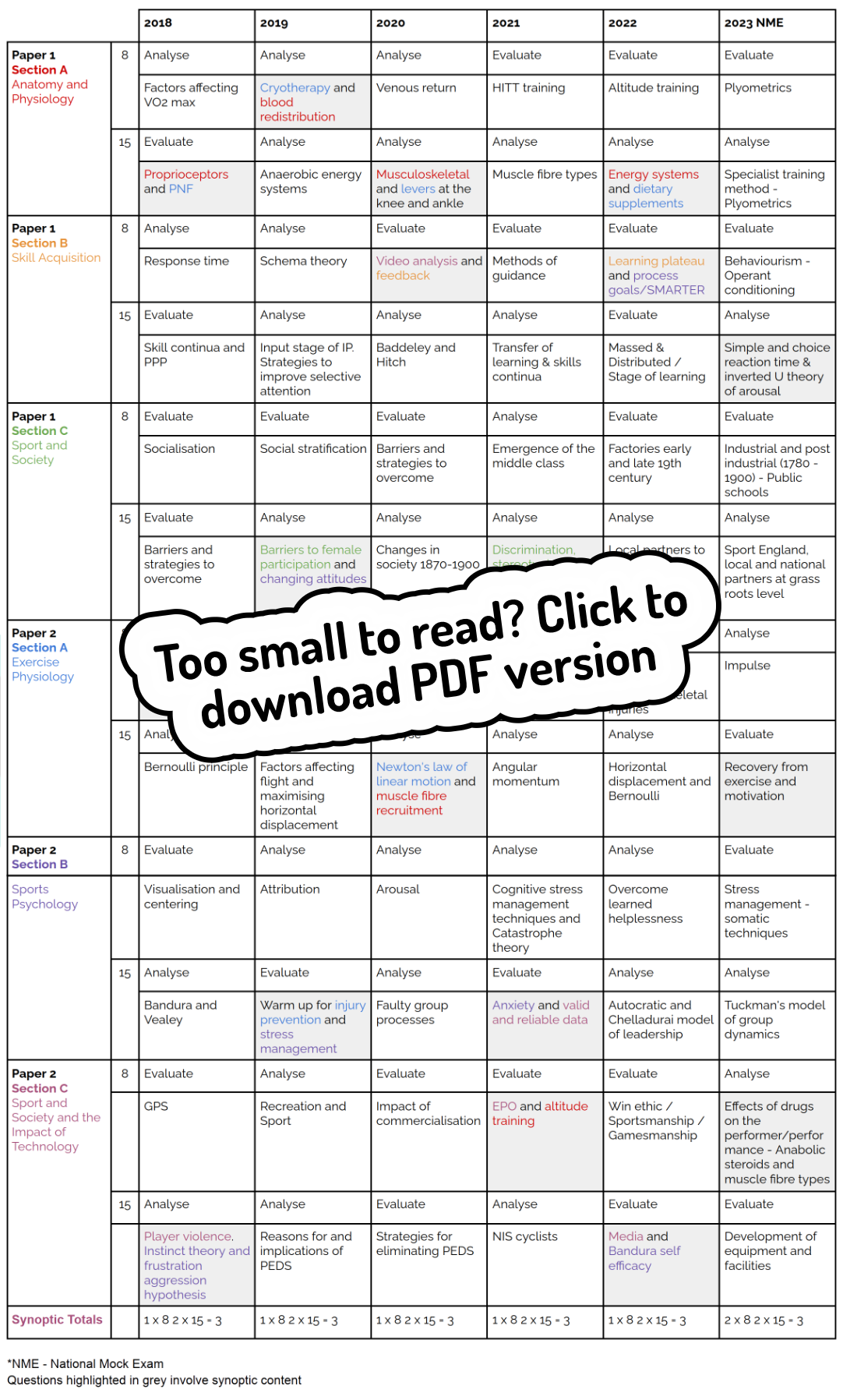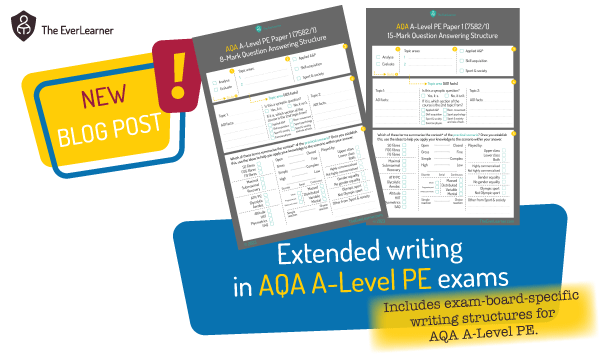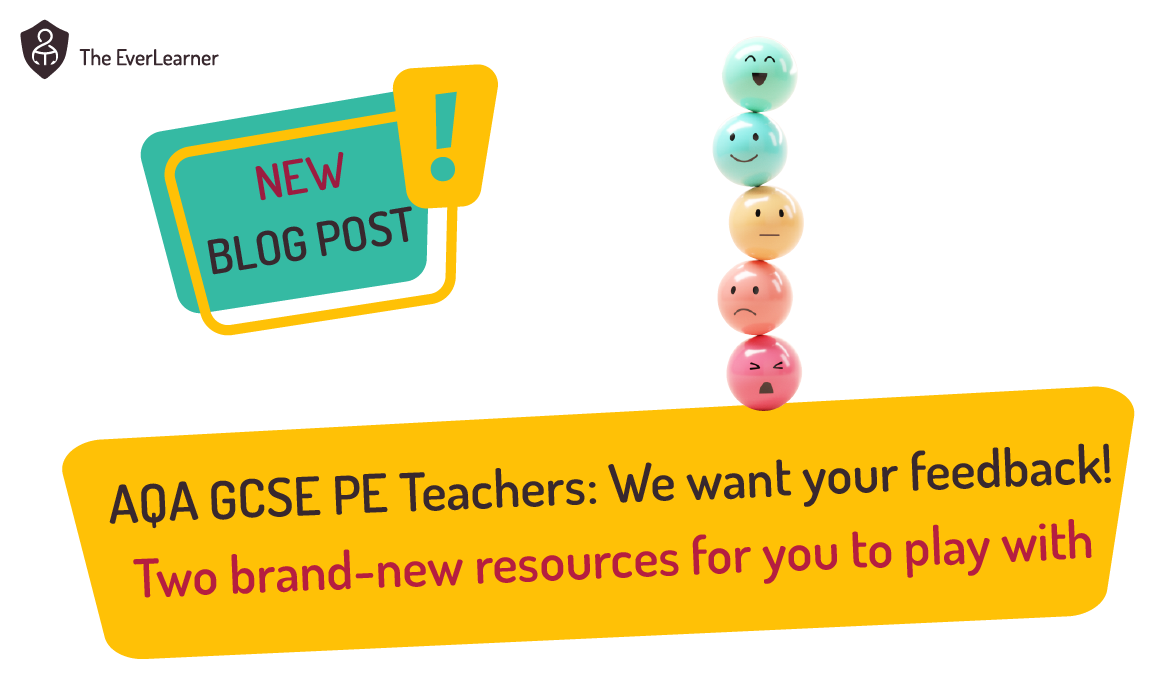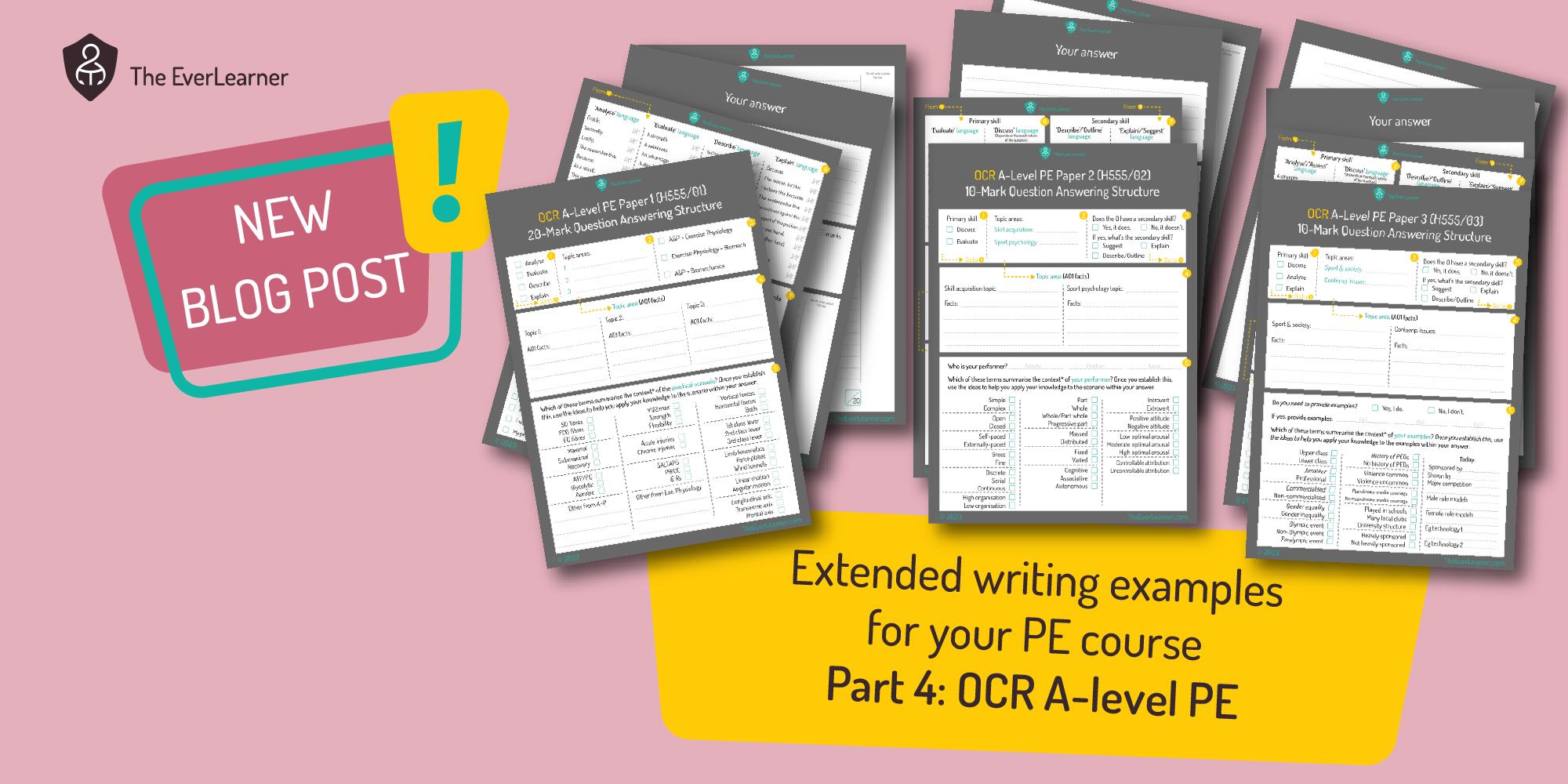Extended Writing in AQA A-level PE Paper 2
Dear AQA A-level PE teachers and students,
This blog is for you. In recent months I have had fantastic feedback on a series of...
- Extended Writing in GCSE PE Exams;
- Extended Writing in AQA A-Level PE exams (Paper 1);
- Extended Writing in OCR A-Level PE Exams.
As you will probably know, AQA A-level PE has, by far the greatest requirement for extended writing and, for this reason, I have decided to publish two brand-new resources today.
These resources cover 8- and 15-mark writing for AQA A-Level PE Paper 2 and these should be utilised in combination with the equivalent resources for Paper 1 (see link above).
The resources are completely free and you can download them directly from this page.
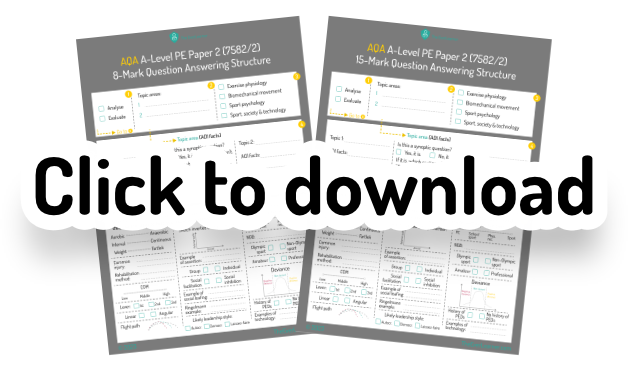 Download your FREE long answer structuring templates
Download your FREE long answer structuring templates
The documents incorporate the requirements for synoptic writing and it is specifically this element of the document that I would like your feedback on. You may be aware that, of the 12 extended writing pieces an AQA A-level PE student will write across Paper 1 and Paper 2, three pieces will be synoptic. Thus far, the synoptic element has always been:
If you look at this image/table, you can also see the trends in how synoptic writing has been structured. Can you see any patterns?
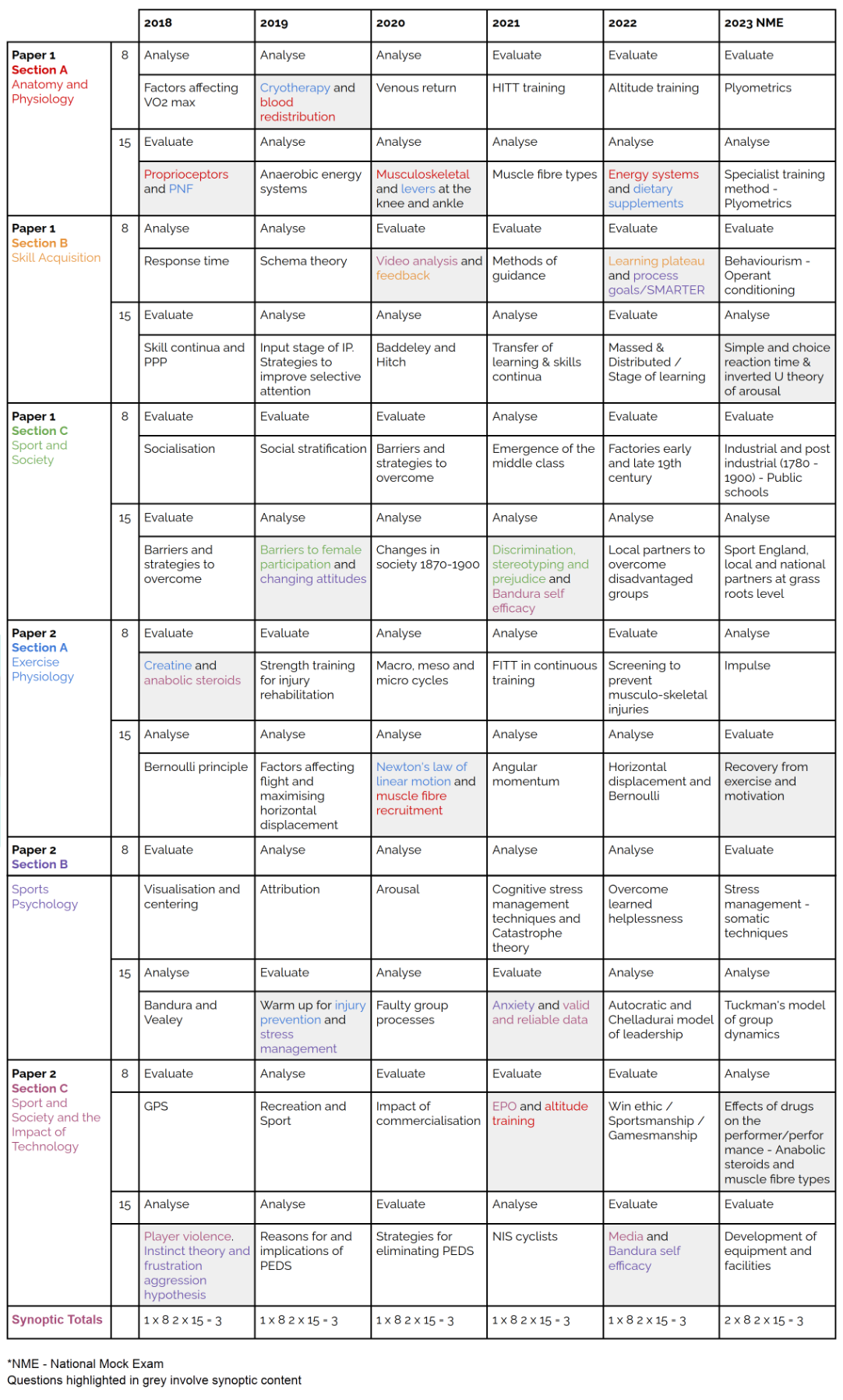
|
2018 |
2019 |
2020 |
2021 |
2022 |
2023 NME† |
||
|
Paper 1 Section A Anatomy and Physiology |
8 |
Analyse |
Analyse |
Analyse |
Evaluate |
Evaluate |
Evaluate |
|
Factors affecting VO2 max |
Cryotherapy and blood redistribution |
Venous return |
HITT training |
Altitude training |
Plyometrics |
||
|
15 |
Evaluate |
Analyse |
Analyse |
Analyse |
Analyse |
Analyse |
|
|
Proprioceptors and PNF |
Anaerobic energy systems |
Musculoskeletal and levers at the knee and ankle |
Muscle fibre types |
Energy systems and dietary supplements |
Specialist training method - Plyometrics |
||
|
Paper 1 Section B Skill Acquisition |
8 |
Analyse |
Analyse |
Evaluate |
Evaluate |
Evaluate |
Evaluate |
|
Response time |
Schema theory |
Video analysis and feedback |
Methods of guidance |
Learning plateau and process goals/SMARTER |
Behaviourism - Operant conditioning |
||
|
15 |
Evaluate |
Analyse |
Analyse |
Analyse |
Evaluate |
Analyse |
|
|
Skill continua and PPP |
Input stage of IP. Strategies to improve selective attention |
Baddeley and Hitch |
Transfer of learning & skills continua |
Massed & Distributed / Stage of learning |
Simple and choice reaction time & inverted U theory of arousal |
||
|
Paper 1 Section C Sport and Society |
8 |
Evaluate |
Evaluate |
Evaluate |
Analyse |
Evaluate |
Evaluate |
|
Socialisation |
Social stratification |
Barriers and strategies to overcome |
Emergence of the middle class |
Factories early and late 19th century |
Industrial and post industrial (1780 - 1900) - Public schools |
||
|
15 |
Evaluate |
Analyse |
Analyse |
Analyse |
Analyse |
Analyse |
|
|
Barriers and strategies to overcome |
Barriers to female participation and changing attitudes |
Changes in society 1870-1900 |
Discrimination, stereotyping and prejudice and Bandura self efficacy |
Local partners to overcome disadvantaged groups |
Sport England, local and national partners at grass roots level |
||
|
Paper 2 Section A Exercise Physiology |
8 |
Evaluate |
Evaluate |
Analyse |
Analyse |
Evaluate |
Analyse |
|
Creatine and anabolic steroids |
Strength training for injury rehabilitation |
Macro, meso and micro cycles |
FITT in continuous training |
Screening to prevent musculo-skeletal injuries |
Impulse |
||
|
15 |
Analyse |
Analyse |
Analyse |
Analyse |
Analyse |
Evaluate |
|
|
Bernoulli principle |
Factors affecting flight and maximising horizontal displacement |
Newton's law of linear motion and muscle fibre recruitment |
Angular momentum |
Horizontal displacement and Bernoulli |
Recovery from exercise and motivation |
||
|
Paper 2 Section B Sports Psychology |
8 |
Evaluate |
Analyse |
Analyse |
Analyse |
Analyse |
Evaluate |
|
Visualisation and centering |
Attribution |
Arousal |
Cognitive stress management techniques and Catastrophe theory |
Overcome learned helplessness |
Stress management - somatic techniques |
||
|
15 |
Analyse |
Evaluate |
Analyse |
Evaluate |
Analyse |
Analyse |
|
|
Bandura and Vealey |
Warm up for injury prevention and stress management |
Faulty group processes |
Anxiety and valid and reliable data |
Autocratic and Chelladurai model of leadership |
Tuckman's model of group dynamics |
||
|
Paper 2 Section C Sport and Society and the Impact of Technology |
8 |
Evaluate |
Analyse |
Evaluate |
Evaluate |
Evaluate |
Analyse |
|
GPS |
Recreation and Sport |
Impact of commercialisation |
EPO and altitude training |
Win ethic / Sportsmanship / Gamesmanship |
Effects of drugs on the performer/performance - Anabolic steroids and muscle fibre types |
||
|
15 |
Analyse |
Analyse |
Evaluate |
Analyse |
Evaluate |
Evaluate |
|
|
Player violence. Instinct theory and frustration aggression hypothesis |
Reasons for and implications of PEDS |
Strategies for eliminating PEDS |
NIS cyclists |
Media and Bandura self efficacy |
Development of equipment and facilities |
||
|
Synoptic Totals |
1 x 8 2 x 15 = 3 |
1 x 8 2 x 15 = 3 |
1 x 8 2 x 15 = 3 |
1 x 8 2 x 15 = 3 |
1 x 8 2 x 15 = 3 |
2 x 8 2 x 15 = 3 |
†National Mock Exam
Questions highlighted in grey involve synoptic content
Download your own copy of AQA A-Level PE Extended Writing Question Analysis.
Why am I releasing these resources now?
Put bluntly, one of the most common requests I get for resources and training is in the support of extended writing. Therefore, I have worked on these frameworks in order to address this demand.
Secondly, I have reviewed all current (and often paid) frameworks that are currently available from other providers. I never wish to be negative but the quality of the work that was previously out there is simply not up to scratch and I have decided to try and disrupt this niche by providing my resources for free and to everyone including directly to students.
I am very aware that there is anxiety in the sector about the 2023 Year 13 cohort being the first, real post-COVID exam group and I want to help as much as I can. Therefore, I want to make a critical point:
Why are the resources free?
Good question! I must admit that I was very tempted to charge for these resources but, ultimately, I want them used by all students, not just those whose teachers are willing to pay for them.
In return for the resources being provided for free, I urge teachers to value them as if they had spent hundreds of pounds on them. My concern is that, because I make them free, teachers may treat them as low quality. The opposite is literally true. These resources have 100% of my heart, brain and professionalism in them and I am currently using them with my own A-level PE students. Please, join me.
What about OCR? What about Edexcel?
The AQA A-level PE Paper 1 and OCR A-level models were published in recent weeks and are all available via our blog homepage. I currently have no plans to provide the Edexcel A-level equivalents. I’m sorry!! There are so few students studying that course that it is very difficult to allocate the time. I know this is disappointing but I really am doing my best.
Please begin to use these documents with your groups and do reach out to me with feedback and comment. You can do that publicly in the comments below or email me on james@theeverlearner.com.
Thank you and have a lovely day.
James
%20Text%20(Violet).png)
